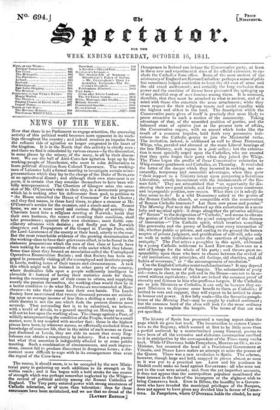The recess, it should seem, is to be occupied by
the new Minis- terial party in gathering up such additions to its strength as lie within reach ; and it has begun with a bold stroke for one source of strength which was perhaps somewhat neglected by the Whigs— the revival of political activity among the Roman Catholics of England. The Tory party entered power with strong assurances of Catholic toleration, or of more than toleration: thus far those assurances have been maintained, and we see that no dread of the Orangemen in Ireland can induce the Conservative party, at least- in these new and experimental days of its official existence, to ex- clude the Catholics from office. Some of the most ancient of the aristocracy of England are Roman Catholics : perhaps a sense of pride has sometimes helped conviction to keep the old coat of arms and the old creed undivorced ; and certainly the long exclusion from power and the sunshine of favour have prevented the springing up of any plentiful crop of nazi homines among them. It is assumed, therefore, that they must be attached to what is ancient, and of a mind with those who entertain the same attachment ; while they crave respect for their religious tenets and social equality with the highest and oldest in the land. The description which the Conservative party gives of itself is precisely that most likely to prove attractive to such a section of the community. Taking advantage of that, of the unsettled position of parties, and the balanced state of opinion just at the present turn of affairs, the Conservative organs, with an accord which looks like the result of a common impulse, hold forth very persuasive invi- tations to the Catholic gentry to join the Ministerial ranks. The invitation, indeed, is addressed as well to those Protestant Whigs, who, puzzled and alarmed at the more Liberal bearings of the late Ministry, seek repose in a juste milieu ; but the exhorta- tion is most specially urged upon the Catholics, who are assured that they quite forgot their party when they joined the Whigs. The Times began the proffer of these Conservative courtesies to Whig country gentlemen and Catholics, on Thursday. It reminded the latter of the danger which they incurred in seeking, not un- naturally, temporary and ostensible advantages, when they gave " their support to a Ministry intent upon pampering a licentious Liberalism, utterly inconsistent with the fundamentals of the Ro- man faith." They are admonished that "an opportunity for dis- abusing their own good minds, and for assuming a more consistent and impregnable position, now occurs. What then (it is asked) do they mean to do? Is a wild Democracy suited to the genius of the Roman Catholic church, or compatible with the conservation of Roman Catholic interests P Let them now pause and ponder." The Morning Post next day followed up this exhortation in a more lofty and mystical spirit : it drops altogether the privative addition of " Roman" to the designation of " Catholic," and seems to elevate the genius of Catholicism into the grand antagonist of the dmmon of innovation—" The Catholic spirit, which breathes something like generosity and the poetry of feeling over every transaction of life, whether .public or private, and casting to the ground the barren sceptre of private judgment, and gratification of self-will, asks only to walk in noble dutifulness under the sanctions of religion and antiquity." The Post seizes a pamphlet in this spirit, addressed by a young Catholic nobleman to Lord EDWARD HOWARD as a sort of hostage for the whole of his party ; and throws great re- sponsibility upon those who have to choose between the revival of " old institutions, old principles, old feelings, old charities, and old habits of reverence," or " the encouragement of revolution." Can the English Catholics resist such fascinations ? It may depend perhaps upon the terms of the bargain. The substantials of patty aid—votes, in short, at the poll and in the House—are not to be se- cured without equivalents ; which are indeed the common proof of sincerity and fairness in him who proffers a bargain. If the Catholics are to Join Ministers as Catholics, it can only be because they ex- pect Ministers to dispense some benefit to them as Catholics; if invited to vote and support, they will expect to be invited to share in honour and power. A few lofty souls—like the favourite pamph- leteer of the Morning Post—may be caught by exalted sentiment ; but the common herd of the class will look for the more ordinary conditions to complete the bargain. The terms of that are not yet specified.


























